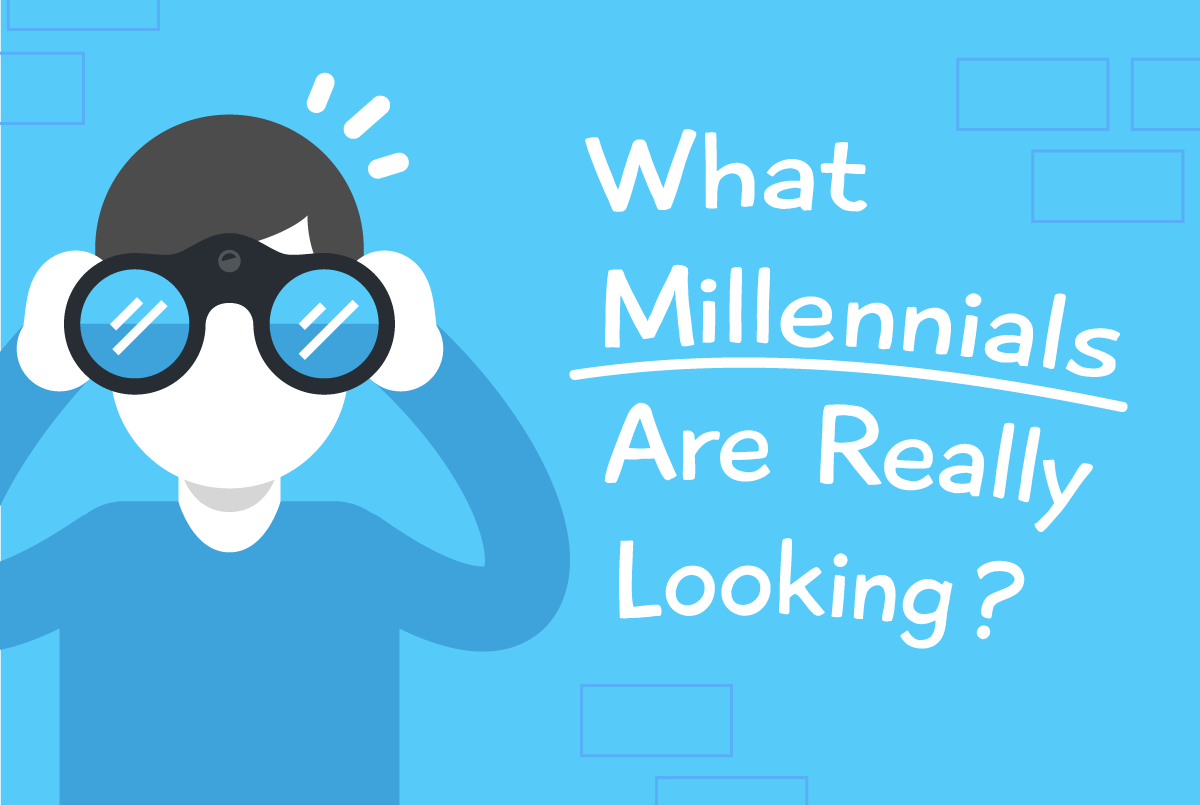What Millennials Are Really Looking For in a Job

It depends on who you ask, but the term “millennial” usually describes people that are currently in the 25 to 34 age range (give or take), which will soon epitomize the largest segment of the American workforce.
Workers in this demographic may not have been born to the internet, but they certainly grew up with it, and are typically tech-savvy and avid social media users.
Sometimes called the “instant gratification generation”, millennials have considerably different thoughts about work and life than generations past, which can make them harder to pin down.
If you know how to appeal to Generation Y, however, you’ll find that they are high-performing, pleasant individuals. As long as you let them do their work on their terms, they will work hard on your behalf. And when you understand how they’re wired, you’ll be better equipped to motivate and retain them within your organization.
Here’s what millennials are really looking for in a job – there are essentially seven prominent considerations you need to be aware of.
An Opportunity To Advance & Grow
Per Harvard Business Review, millennials tend to view their current careers as a stepping stone onto new ventures. As result, they value opportunities for growth more than any generation that has come before them.
It makes sense – Generation Y doesn’t want to follow in the footsteps of their parents or even their grandparents. They don’t want to remain in one or two careers for their entire life. They want to grow in their current role and prepare for future opportunities, and they don’t want to feel stuck.
The G Brief tells us that when millennials aren’t offered opportunities to advance, they begin to look elsewhere: “a third of millennials that quit do so because their career goals don’t line up with their position. In fact, lack of opportunities is the number one reason millennials job-hop. Without opportunities grow in-between steps, trainings, and titles, your millennial workers may look to advance their careers by leaving.”
Chiefly, if your company doesn’t offer opportunities for advancement, then your culture may not appeal to millennials. When an employee feels like you care about their long-term growth, they’re more likely to stay with your organization and tap into the opportunities you offer.
But another important consideration, as you’ll find out later, is job security. Interestingly, a large portion of millennials cite job security as a key factor as to whether they will still in a job or not. Managers tend to assume that younger workers aren’t looking for security in their jobs, and millennials leave to find new jobs because they don’t think it’s available at their workplace. This is a vicious cycle you need to mitigate if you want to keep more of your employees happy.
Flexibility
Fortune.com identified three things millennials are looking for in a job, and one, unsurprisingly, is the opportunity to grow personally and professionally – something we just looked at.
Another important factor is job flexibility. Young jobseekers don’t want to land a job only to be inserted into the 9-to-5 grind. They want to be valued for their performance as opposed to their ability to fill eight hours of their day with meaningless busywork.
Per ADP, a Bentley University study indicated that 77 percent of millennials believe that a flexible schedule would make them more productive.
But what exactly does “flexibility” mean to younger employees? Per Inc.com, “Flexible work is typically defined by the flexibility in the amount of hours worked, the scheduling of hours worked, the place of work, and how work gets completed.” Why is flexible work so important to millennials? Inc.com tells us that it’s because:
– 40 percent of millennials identify themselves as working parents that want work-life balance.
– 70 percent of millennials say the desire to travel is the primary reason to work.
– No millennial identified traditional working hours as being the most productive.
Furthermore, the office was not seen as the optimal environment for productivity.
The millennial generation has grown accustomed to convenience and efficiency unlike anything that was available only 30 to 40 years prior – just think of Google, Uber, and Airbnb. If you want to appeal to Generation Y, you’ll need to offer more flexibility – not just personal and sick days, but also the ability to work from home, so long as their work is being completed satisfactorily. This can be accomplished with the help of video conferencing and screen sharing software.
Some millennials have important responsibilities outside of work, and others are simply trying to plan for their futures. With this understanding, setting ground rules for work can help them make a clear distinction between work and personal time.
A Sense Of Purpose

Fortune.com also notes that millennials want to be a part of the solution, which is due to their greater sense of self-purpose and interest in social causes.
Young workers don’t want to work on something just because they were told to – they want to know why it’s important to the company and how it fits into the grand scheme of things. If you can help them understand what you’re building towards, what the bigger vision of the company is, and how they’re contributing to that purpose, they will feel more at home working for you.
Peakon tells us that salary and financial compensation alone will not encourage millennials to reach for their potential: “This is proven by the fact that some of today’s most important online resources – from Wikipedia to Linux – are open-source systems. These are enriched by people around the world who voluntarily offer their expertise.
No one gets paid to write for Wikipedia, yet it is one of the world’s leading encyclopedias; available in scores of languages.” They point out that young workers are actively seeking out meaning in their work. While a competitive salary is still important (key point), if they lack purpose, and you lack purpose, they won’t stick around for long.
Per The Guardian, “Employees who feel like their work creates positive impact are more likely to feel fulfilled, promote their company and stay on the job longer. Studies have shown that inspired employees are almost three times more productive than dissatisfied employees. Imagine what you could do if you could triple your current workforce with inspiration, rather than more hiring.”
Collaboration is a key consideration that will be explored further later. Thanks to the fulfillment and connection it creates between your staff, it can keep them inspired and productive for longer. This is one way you can encourage retention within your organization.
It’s also worth examining what good your company is doing for the world at large. Younger workers want to see that you are contributing on a grander scale. Deloitte’s Millennial Survey showed that six in 10 respondents said “sense of purpose” is part of the reason they chose their current employer.
Does your company have a larger sense of purpose? What values do you stand for? What causes do you support and stand behind?
Job Security
Millennials have grown up during the global recession. As result, according to World Economic Forum, job security is of utmost importance to young employees.
This does not mean that they see themselves staying in one role at one company for the rest of their lives, which is how past generations would have defined job security. This might also explain why they put such a great emphasis on skill development, something many will willingly invest their own money into.
Surprisingly, millennials are taking a long-term view to their working life. That might surprise you based on what you’ve heard about their need for instant gratification. But many are planning ahead by investing into their education and training so they are ready for future opportunities, knowing they will likely have many careers in their lifetime.
According to StuDocu, millennials feel difficult to balance work and study and they appreciate it if companies allow flexible working hours, work remotely from home, and part-time work.
Per Inc.com, 87 percent of millennials insisted that job security was the thing they most craved from a job.
The Wall Street Journal points out that the reputation millennials have earned as job-hoppers is actually incorrect. Most go into jobs hoping to find security, and even the youngest of Generation Y are thinking about their future – buying a home, starting a family, taking vacations, and so on.
They further add that: “Managers and leaders think job security isn’t important to millennials, and therefore neither offer it nor talk about it as part of the employee value proposition. Millennials, thinking job security isn’t an option where they are, seek new jobs elsewhere where they can at least improve their pay and development opportunities, and think they might have a better shot at job security.” Meanwhile, leaders that recognize the importance of job security can use it as a competitive advantage to attract the best talent possible.
Does your company offer opportunities for advancement? If not, you shouldn’t be surprised when your younger team members start shopping around for other prospects.
Work-Life Balance
Work-life balance could also be thrown in with “flexibility”, but in case you missed the point from earlier, or if you need any clarification, it’s worth addressing again. Per World Economic Forum, “good work/life balance” was the number one answer millennials gave when asked what makes them want to stay in a job.
Millennials know they can work productively from anywhere, thanks to advancements in technology. Meanwhile, many older managers and executive see empty cubicles and wonder what’s going on. They wonder if their employees are willing to put in the work necessary to excel in their jobs. This is where there is a significant disconnect between generations.
Generation Y doesn’t just want to choose where they want to work from – they also want to choose when. Per The Washington Post, many even said they would forgo a promotion if it meant that they could work in a role that allowed for better work-life balance.
They also note: “Lack of flexibility was cited among the top reasons millennials quit jobs. And nearly 40 percent of young workers, male or female, in the United States are so unhappy with the lack of paid parental-leave policies that they say they would be willing to move to another country.”
Micah Solomon, President of Four Aces Inc. shares on Forbes: “Millennials have often shared with me their unwillingness to sacrifice their off-work time or to make other lifestyle compromises in return for financial compensation.” He adds, “Regardless of the reason for this attitude, it needs to be taken into consideration by employers today.”
Solomon goes on to talk about the fact that many young workers want their evenings and weekends free and clear. He also says there isn’t necessarily a catch-all solution, but that it’s important for companies to acknowledge this need, and recognize that it isn’t completely unique to Generation Y. Many jobseekers and employees appreciate and even desire proper work-life balance.
Is work-life balance a priority in your company?
Collaboration
Again, this might come as a bit of surprise. When you think of Generation Y, you probably think of grown adults retreating into their own smartphone/texting world, never to look up unless it’s absolutely necessary.
But WeSpire tells a different story: “A positive work environment can help instill a sense of community, create transparency, and encourage collaboration amongst your employees. Millennials in particular want to be involved in the process of building and maintaining a great working culture.” They add that it can be anything from company outings and meetings to encouraging more feedback or rearranging the office. Getting your people involved and moving as a team will help you retain your best talent.
Huffington Post also notes that a culture of collaboration is one of the top things millennials are looking for in an employer.
They add:
– Generation Y wants to leverage technology to connect with the world. And by the world, we do mean overseas connections.
– Some of the best companies blend physical and virtual tools to innovate and encourage a more collaborative environment.
– A study from The Wharton School of Business at University of Pennsylvania shows that employees who feel they are working in a loving, caring culture reported higher levels of satisfaction and teamwork, leading to better performance.
– Collaboration creates meaningful bonds between employees, resulting in more appreciation for each other.
As it turns out, tech-involved young employees need human connection just as much as the rest of us. How will you be fostering a collaborative culture within your company?
Personal Device Use & Workplace Technology
Per CIO, tech-savvy millennials want to be able to conduct work on their own smart-devices.
They tell us: “Microsoft found that 58 percent of millennial respondents said they use their own devices to work and 57 percent responded that it’s important to them to be able to use their own device.” Furthermore, many young workers use more than once device at work.
Additionally, “Microsoft found that millennials want the ability to use the newest tech to extend their careers. Of those surveyed, 93 percent noted it was important to them to work for a company that has updated technology. And of that 93 percent, 48 percent said it was ‘extremely important.’”
But it isn’t just the ability to use their own devices that millennials are looking for – they also want to work in companies that are forward thinking in their approach to technology.
Per Insight, 82% of millennials believe that workplace technology would influence them when deciding to accept a job.
Technology is also changing the way work is done here in the digital age, and this movement is being driven by Generation Y. If you aren’t willing to adapt, or if you have a problem with workplace technology, you may not be able to attract and retain more young talent.
Final Thoughts
Ultimately, your success with millennials comes down to your willingness to communicate and learn from them.
If you were to ask all of planet earth how they would define “love”, you would likely get seven billion different answers, though there would be many commonalities between them.
The same can be said for the millennial generation. Not every millennial you talk to is going to tell you that all the above factors – an opportunity to grow, flexibility, a sense of purpose, job security, work-life balance, collaboration, and workplace technology – is important to them (at least not in those exact terms), but some commonalities will emerge. As an employer, you must pay attention to these similarities. There is plenty of research and data showing what Generation Y wants in a job. But how it’s described and how it should be executed and carried out in real life may not be one in the same.
The best strategy to understand what your young workers want is to keep the lines of communication open and to take their feedback seriously. At times, millennials requests may seem unreasonable. But if you can find a reasonable compromise, or if you experiment with trial runs and pilot programs to show that you are listening to them, you will likely find that millennials can just be just as productive as generations past – even while doing it on their own terms.
Millennials aren’t just trying to buck convention. They’re trying to move forward in their careers and lives in a way that they feel is most beneficial to their future. How you collaborate with them is up to you, but it’s likely you will need to make some changes and compromises as you look to work with more of them.
What do you think? What has your experience been with millennials? Let us know in the comments below.
JD enjoys teaching people how to use ZoomShift to save time spent on scheduling. He’s curious, likes learning new things everyday and playing the guitar (although it’s a work in progress).



